- Home
- J. -H. Rosny aîné
The World of the Variants Page 2
The World of the Variants Read online
Page 2
“Alcuin, Lacal—fire!” ordered the captain.
By the light of the muzzle-flashes we glimpsed the mighty silhouette, crouched for a final leap—then, before Devreuse was able to give any further order, the beast was upon us. An agonized scream rang out in the impenetrable darkness, followed by two seconds of infinite horror. No one dared fire! Then there was another scream, and a crunch of jaws. Finally, someone fired.
The flash of light showed us two of our men down, and the tiger rearing up, ready to fell a third. By the same token, the beast’s position was known. Rifle-shots rang out: four shots—and the beast uttered a frightful groan. A brief silence followed.
“Him wounded!” whispered the guide.
Scarcely had he spoken than a hoarse growl replied. I sensed the movement of a formidable mass; I was seized implacably and irresistibly, rolled over and shaken, then carried away like a sparrow by a lynx.
I’m doomed! I thought.
I was overwhelmed by an incredible resignation. I abandoned myself to death. I felt no pain; I was in a state of lucid delirium. I held on to my rifle, mechanically…
An interminable time went by; then there was an abrupt halt. I was lying on the ground. I felt strong fetid breath on my face…and suddenly, my resignation evaporated, changing into an immense terror and an immeasurable regret for the loss of life.
A taloned paw came down; I thought that I was about to be torn apart, pounded and devoured. “Adieu!” I cried, feebly—and yet, with a desperate instinct, I had raised my rifle. There was a flash, and a bang!
The beast howled and leapt into the air—and leapt again.
I was still lying down, still expecting to die. I heard a colossal groan three paces away. A faint hope crept into my heart. What’s happening? Am I going to die, or to live? Why am I free? Why is the beast groaning without seeking vengeance? A movement! It’s getting up again—I’m going to die…no, it’s fallen back, no longer growling. Silence! A great silence!
How long did all that take?
Terror and horror give rise to infinity. I found myself standing up without knowing how, without any mortal injury. Human footsteps were approaching, and a voice—that of the Asiatic: “Him very dead!”
In the darkness, his hand had grabbed mine. I replied with a powerful grip—but the anguish remained: doubt as to whether the beast was really dead…or whether it would get up again and pounce.
It was certainly not moving, though, not breathing. Nothing could be heard but the monotonous fall of the rain and the tentative footfalls of my companions.
The captain’s voice rang out: “Robert, are you all right?”
“Yes.”
I succeeded, after several attempts, in lighting a match under cover of my overcoat. In that faint gleam the apparition was gripping: the giant beast in the red mud, still beautiful in its attitude and menace, its mouth tightly closed over its immense carnivorous teeth, one paw advanced, showing its sharp talons. In truth, it was no longer moving, no longer palpitating! How had that come about? Was it possible that I was here, among the living, saved from the hideous peril? Was it me who was breathing? Oh, I had really thought that my last moment had come, and felt the icy breath of annihilation.
“Him very dead!” the Asiatic repeated.
Groping our way, we rejoined the captain and went back to the eminence. There, a soft and tremulous voice made my heart beat faster.
“Are you hurt?”
“No, Mademoiselle…not grievously, at any rate. The beast must have held me by the leather and rubber of my garments. How are the others?”
“As for me,” said Alcuin, “I seem to have a nasty scratch on my chest. The tiger left me right away…”
A second voice, more muffled and more plaintive, said: “I’m wounded at the hip…but the shock was the most terrible thing…”
We were no longer paying any heed to fatigue or the rain; our escape from terrible peril filled us with an almost joyful excitement. A faint grayness was beginning to tint the eastern horizon. For some time, that light remained uncertain, scarcely allowing us to see one another. Finally, it increased, and there was daylight: a miserable daylight in a desolate region, where the rain was causing the marshes to overflow. The excitement died away in confrontation with the wretchedness of the landscape; a profound sadness penetrated our souls. Personally, I only had eyes for the brilliant Sabine, who illuminated my destiny as the pole star did for ancient mariners.
Our wounds were not serious enough to force a delay.
Another day went by in the horrid wilderness, beneath the implacable, energy-sapping rain. The men complained incessantly. They kept their distance, conferring in secret. When I approached them, they looked at me mistrustfully. It was not difficult to deduce that they were plotting—and although I, personally, was willing to follow the captain to the ends of the Earth, I understood their discontentment and felt sorry for them.
At about 4 p.m., Devreuse decided to call a halt. In addition to our excessive fatigue, and the care we had to give the wounded, the halt was determined by the unexpected discovery of shelter. In the midst of the plain there was a bizarre protrusion of rock almost 90 meters high. We climbed it by means of a large fissure that seemed to have been completed by human hands. The summit of the hill formed a plateau, in which there was a cave. The sloping floor of the cave was quite dry; the whole formed a large space, fairly well-lit.
After two days of downpour, the shelter seemed rather providential, so our men manifested the intention of spending the night there. The captain could not refuse such a reasonable request. Our little horses were brought up without difficulty, and we found ourselves lodged in unexpected comfort—unexpected in that, in addition to the cave, properly speaking, we found corridors and coverts where we could take care of a few hygienic concerns. There was no lack of water—a depression in the plateau formed a small pool, all the fresher because it was continually running.
An hour later, with our wounds well-dressed and some of our clothes hung up to dry, we finished eating the provisions remaining from our last hunt—a few slices of venison cooked in advance. It would have been nice to drink a cup of hot tea, though! Alas, we had no fire.
“It would be useful to go cut a few branches,” said one of the men.
“They wouldn’t have time to dry,” said the captain, morosely.
“Really!” the man replied. His tone disturbed me. At that moment I was standing on the threshold of the cave with Sabine. We were contemplating the country through the melancholy curtain of rain. I was savoring the delight of the moment. How graceful she was! In her gray mantle, her damp hair negligently braided and her complexion diaphanous, Sabine retained a palpitating sensation of life and sacred youth. All nostalgia and all anxiety vanished in the curve of her mouth, her mysterious smile… The man’s voice—it was Alcuin’s—caused me to turn around, though.
Devreuse had also been struck by the reply. “What did you say?” he snapped, with severity.
Alcuin, anxious at first, replied with respectful firmness: “It’s just that we’re very tired, captain. We need a few days’ rest…and Lefort’s wound requires care.”
His companions nodded their heads approvingly—which gave the captain pause for reflection. As usual, though, the obstinacy of his will prevailed. “We’re leaving tomorrow morning!”
“We can’t!” And Alcuin risked adding: “We need five days rest. The shelter’s sound—we can get our strength back.”
A shadow of indecision passed over the commander’s hard features—but the man was too inaccessible, absolutely resolute to the point of obsession, with a superstitious belief in his own prescience. He had decided, privately, that there was a way out to the south-east, and he did not want to lose a single day.
“We’re leaving tomorrow morning!”
“And what if we can’t?” Alcuin asked, softly.
Devreuse’s expression hardened. “Are you refusing to obey my orders?”
“No, c
aptain, we’re not refusing, but we can’t go on! The expedition was only supposed to last three months.”
Devreuse, who was agitated, evidently recognized that there was some justice in his subaltern’s claim, or he would not have delayed his response. I still hoped that he might yield to common sense and grant the respite—but no; it was impossible for him to give in.
“That’s all right,” he said. “I go on alone.” Then he turned to me. “Will you wait for me here for ten days?”
“No!” I cried. “If these men abandon you, I can’t blame them—but for myself, I swear that I won’t leave you until we reach civilization!”
The men remained impassive. Devreuse’s stern lips displayed an unaccustomed emotion. “Thank you, Robert!” he said, emphatically. Addressing the others, disdainfully, he said: “I shan’t hold your conduct against you, considering the length and fatigue of the journey, but I order you to wait for us here for a fortnight. Further disobedience, save in the case of force majeure, will be considered treason.”
“Until the evening of the 15th day, at least!” Alcuin replied, humbly. “And we regret…”
Devreuse cut him off with an imperious gesture. We remained in somber silence for some time.
II. Confession
I got up at dawn. Everyone else was still sleeping soundly. I was nervous, full of anxiety for the delicate Sabine, whose father was about to expose her to new perils. I reproached myself for my resolution; perhaps, if I had sided with the others, the captain would not have been so stubborn. The idea gnawed away at me—and yet, intractable as he was, the opposite seemed more probable. Would he not have left on his own, taking Sabine? That separation would have been more bitter to me than death.
Thus I reflected, on the threshold of the plateau. A dismal day was beginning in the inexhaustible rain. The entire country was waterlogged; the water was triumphant over sky and Earth alike.
Suddenly, I heard a slight noise behind me—light and prudent footsteps. I turned round; it was her, Sabine. Wrapped in her little cloak, she approached with an air of gracious mystery. With that, all fear and sadness was dissipated. Even the rain became charming.
Immobile, hypnotized, I was about to stammer a polite greeting when she said: “I’ve come to talk to you.”
These simple words held an infinity of mystery and anxiety. “I was very touched by your devotion,” she continued. “My father, who will be eternally grateful to you, doesn’t know how to express gratitude. May I thank you on his behalf?”
Oh, the morning hair, falling loosely over the dazzling nape of her neck! The humble gray mantle, more beautiful than a fairy’s robe! The delightful cave-entrance, the soft rhythm of the rain, accompanying my beloved’s words! I no longer felt anything but the force of adoration; my every nerve was charged with love. But I was gripped by anguish—the moment was too beautiful! It had—how can I know why?—completed my passion at a stroke. It was the flash of lightning that unleashed the storm. Everything was doubtless ready; the profound and durable tenderness had been flowering in my soul for a long time—but so often, love, even when powerful, founders in long silence, in a silence that can never be broken. One slight venture—one nice gesture, like Sabine’s at that moment—may leave no further alternative but happiness or distress, triumph or mortal, unanswered, love. That morning, I knew that I was about to speak, I knew that I was about to interrogate my destiny. From what tortures the next minute might deliver me—or what a curse might love become!
“If I was able to please you in saying what I did…the recompense is too great!”
She looked at me with her lovely clear eyes, and the spell was further increased. “Too great?” She was blushing now. As for me, my breathing was so rapid that I lost my voice momentarily. How could I dare to speak to her? And if I spoke, what if it was for nothing? What if she refused? What if those hands were never to grip mine, or those red lips…? Harsh, powerful doubts—how they squeezed my heart!
Finally, I was able to speak. “Yes, too great. Your thanks would repay any peril and any devotion!”
She lowered her eyes. Her lips quivered over the pallor of her teeth. Sabine was my destiny; she embodied Life and Nirvana in her lowered eyelashes.
Tremulously, I said: “Does my devotion alarm you?”
“I would have to be very timid, if so,” she said, with slight irony—but a very gentle, almost tremulous irony!
The doubt persisted: the terror of losing everything on a single throw of the dice.
At hazard, I stammered: “Don’t you want me to follow you forever?”
“Forever?”
“Yes, for as long as I live?”
She assumed a serious expression. I felt faint. But there was no going back; I had thrown the dice.
“Would you like me to ask your father if he wants me as a son?”
Doubt passed over her face; then, with charming bravery, she said: “Yes, ask him!”
“Sabine!” I cried, with an almost painful joy. “Can I believe that you love me?”
“What else can you believe?” she said, the hint of irony returning—that tender and affectionate irony.
Silhouette of happiness, rain-swept early morning, paradise of marshland! Gently, I had taken her pretty hand and raised it to my lips.
And I felt that I was the Master of the World.
III. The Man of the Waters
The captain, Sabine and I had left the men behind two days before. We were advancing through country that was even bleaker, but possessed of a tenebrous and grandiose beauty. Whether there was a way through or not, the march was becoming more painful by the hour. Fortunately, we had only brought Sabine’s little horse; our own mounts would have been more of a burden than a help.
Toward the end of the second day, the rain stopped. We were surrounded by pools on all sides. We were making slow progress along a ridge.
“It’s getting dark! One more effort!” said the captain.
Night was, indeed, falling. The light was fading as the Sun set. We were heading for what seemed to be a hillock. I don’t know what happened to Sabine’s horse, but it suddenly bolted, passing to the left of the hillock like lightning. Sabine uttered a loud scream. Her mount had just plunged into the marsh. I had no time to think; I was beside her within a second; the soft Earth dragged me down in my turn.
For a few minutes, we tried to break free.
“Moving only makes us sink deeper!” Sabine remarked.
That was incontestable. Trapped in a tangle of plants, we could neither go forward, nor retreat, nor climb back up. It was one of those traps in which inert nature seems to swallow living beings with a slow but sure ferocity.
The captain had not lost his presence of mind, however. He advanced indirectly, along a small promontory whose tip slanted toward us. He had uncoiled several meters of the rope that he always carried on his person, and was getting ready to throw us one end. He was our only hope, and we watched him anxiously.
Suddenly, he slipped, stumbled, and tried to step back. The soil of the promontory at the place where he was standing, doubtless composed of a thin vegetable crust, had collapsed into the green water. Devreuse reached out his arms, clutching at random, but his hand only encountered an illusory support; his situation had become identical to ours!
And night was falling! Only vague shapes were now distinguishable. Animals were sighing or wailing in the half-light of the vast wilderness. Will-o’-the-wisps were flickering over the marsh. We were prisoners of the mud! Every movement caused us to sink deeper; every minute marked a stage in our frightful death-throes. A faint and murky crescent moon appeared between the misty clouds, seemingly immense as it posed atop a distant curtain of poplars, already on the wane. Sabine’s horse was rump-deep; she looked at me, beginning to despair.
“We’re doomed, Robert!”
I tried to find something nearby to hold on to, but everything gave way, and every attempt hastened the moment when…
“Well,” said th
e captain, “if no help arrives—and I don’t see where any can come from—we are indeed doomed, my poor children.”
His harsh voice had taken on an inflection of tenderness; that made me feel even worse. Sabine’s eyes dilated in horror. She looked at us in turn, and all three of us abandoned ourselves to that hideous state in which struggle is futile, in which the elements are devouring you, draining more of your strength with every passing minute.
“My God!” Sabine sighed.
The Moon, chasing away the mist, shone brightly over the lagoon. A few solitary stars appeared in the south, like a little archipelago in the bosom of an ocean. The wind skimmed the marsh slowly, with a heavy and toxic gentleness.
The mud reached my shoulders; another half-hour and I would disappear. Sabine put out a hand to help me.
“We’ll die together, my dear Robert!”
Lovely girl, be blessed in death!
Suddenly, a confused melody rippled over the algae: a strange, unknown music from another time and another place, indistinguishable to our gross senses at intervals, and yet perceptible.
I looked around. The Moon was in a clear patch of sky; its light fell brightly. I saw a slender human silhouette standing on a tongue of land, a sort of long, low-lying islet. His fingers were holding a slim object whose form I could not quite make out.
And we saw an extraordinary scene unfold.
Giant salamanders were climbing on to the islet and gathering around the man, along with newts, olms and water-snakes. Bats were flying around his head, grebes were dancing to the rhythm, and yet more vague forms accumulated, including rats, water-fowl and owls. The man continued to play his bizarre music, and a great calm descended upon the scene: a sentiment of pantheistic brotherhood that I felt strongly, in spite of the horror of our situation.
We uttered cries of distress. The man stopped playing and turned toward us. When he saw our situation, he leapt from his islet and disappeared into the algae. Anguish and hope, interlaced like lianas, held us motionless.

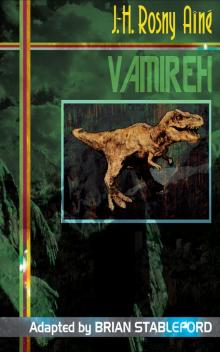 Vamireh
Vamireh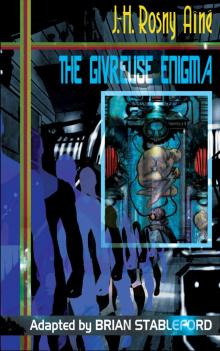 The Givreuse Enigma
The Givreuse Enigma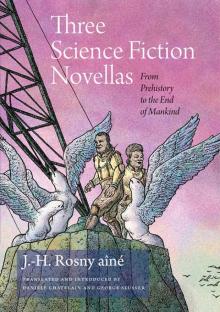 Three Science Fiction Novellas: From Prehistory to the End of Mankind
Three Science Fiction Novellas: From Prehistory to the End of Mankind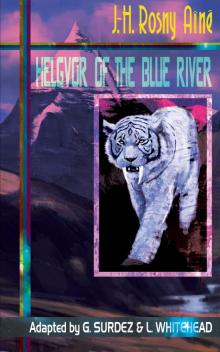 Helgvor of the Blue River
Helgvor of the Blue River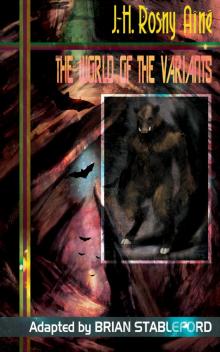 The World of the Variants
The World of the Variants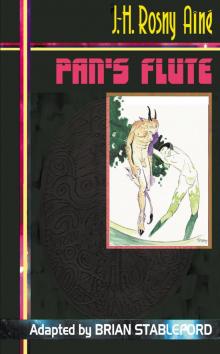 Pan's Flute
Pan's Flute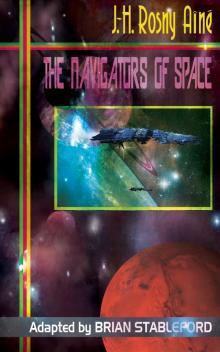 The Navigators of Space
The Navigators of Space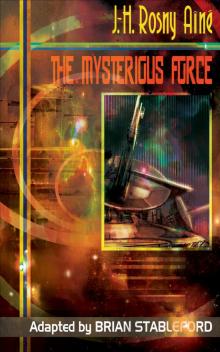 The Mysterious Force
The Mysterious Force